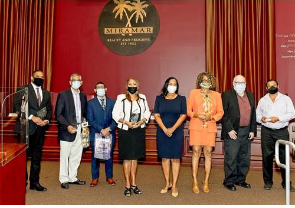Economy Seen as Overarching Issue for Americas Summit
By Merle David Kellerhals Jr.
Washington — While economic prosperity, energy security and environmental sustainability are primary issues for the fifth Summit of the Americas in April, the overarching issue confronting the Western Hemisphere is the current economic crisis, says a senior U.S. diplomat.
“We have to protect the social gains we’ve made in the past decade in this hemisphere,” Assistant Secretary of State Thomas Shannon said at a March 12 Washington conference.
Shannon, who is assistant secretary for Western Hemisphere affairs, said the broad agenda of the 34-nation summit, which is being held April 17–19 in Port of Spain, the capital city of Trinidad and Tobago, focuses on promoting human prosperity, energy security and environmental sustainability. But the current economic crisis and access to increased credit and lending from multilateral banks, subregional banks and international development banks will be major topics of the three-day meeting of hemispheric leaders, he said.
Protecting the political and economic gains that have been made is important, but it is critical that economic recovery is not built on the backs of the poor, Shannon said. And, hemispheric nations should not let differences on other issues impede progress, he added.
President Obama, who will be making his first appearance at the Summit of the Americas and meeting most hemispheric leaders for the first time, will bring an attitude of mutual respect and a genuine desire for engagement, Shannon said at an Inter-American Dialogue conference on the summit.
This summit is the first meeting of all 34 democratic heads of government from Latin America, the Caribbean, Canada and the United States since the 2005 Mar del Plata Summit in Argentina that ended without resolution on a number of contentious issues. Cuban leader Raul Castro has not been invited to attend, though future relations with Cuba will be discussed.
To date there have been four summits of the Americas, two special summits of the Americas, and a number of ministerial-level summits held since 1994, when the Clinton administration hosted the first regional leaders’ meeting in Miami.
The Summit Implementation Review Group has been meeting to reach consensus on the draft summit declaration that will be presented to hemispheric leaders for final approval on the closing day of the conference. The group is the political and negotiating body responsible for follow-up on summit mandates, coordinating the summit agenda and preparing for future summits.
The Trinidad and Tobago ambassador to the United States, Glenda Morean-Phillip, told the conference that the draft document being prepared will be completed by the end of March.
Ambassador Jeffrey Davidow, who is a special adviser to the Obama administration for the Summit of the Americas, said two processes will converge at the summit. The first is the summit implementation process, which is completing work on the draft document.
The draft document that will be considered by hemispheric leaders is large and complicated, with six sections that address prosperity, energy security, environmental sustainability, public security, democratic governance and summit progress, he said.
“This is an important negotiation,” Davidow said, because it can be instrumental in determining how effective the summit can be.
The second process is preparation of the United States delegation led by Obama. The president, Davidow said, will come to the summit with a spirit of equality, equity and responsibility. And Obama is coming to cooperate, Davidow said.
The president is coming to meet with hemispheric leaders, exchange ideas and listen, Davidow said. There will be three sessions the first day and on the last day the 34 hemispheric leaders will conduct a retreat without delegations or aides, he said.
Davidow said the summit is “a golden moment” to address significant regional issues.
Before meeting with summit leaders in mid-April, Obama travels to London April 2 for a critical meeting of the G20 group of economies to address the expanding economic recession. Five of the Western Hemisphere countries will attend the G20 meeting — Argentina, Brazil, Canada, Mexico and the United States.
Brazilian President Luiz Inácio Lula da Silva will meet with Obama at the White House April 14, according to the White House.
“The president looks forward to consulting with President Lula on effective measures to respond to the global financial crisis during the upcoming G20 meeting, ensuring a productive agenda for the Summit of the Americas in April, and on ways to deepen cooperation on other wide-ranging issues in the bilateral relationship,” the White House said in a prepared statement.

